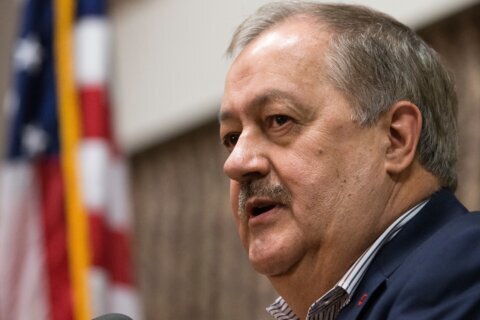The 2021 March for Life unfolded Friday mostly virtually under the cloud of a pandemic, encouraging participants to remain committed to the anti-abortion cause despite a Biden administration already drawing a sharp contrast from a Trump White House that partnered with the movement.
The rally maintained much of its usual ethos despite shifting online, with appearances from faith, political and activist speakers, musical interludes and themed video segments.
“As we enter the beginning of a new presidential administration, one that has signaled they will make divisive, pro-abortion, pro-death policy decisions like forcing taxpayers to pay for abortions here and abroad, while also sending more government funding to abortion providers like Planned Parenthood, we ask President Biden to consider unifying, pro-life policy decisions,” March for Life President Jeanne Mancini told participants at the virtual rally.
She called for unity and urged supporters to keep up pressure on President Joe Biden. On Thursday, the President reversed the so-called Mexico City Policy, a ban on US government funding for foreign nonprofits that perform or promote abortions, and directed the Health and Human Services Department to work on rescinding the Trump administration rule blocking health care providers in the federally funded Title X family planning program from referring patients for abortions.
Also on Friday, about 50 prominent anti-abortion activists physically marched in Washington under this year’s theme of “Together Strong: Life Unites!” The difference between the small group and the usual event was stark — in prior years, thousands of marchers sporting signs, flags, banners and clothing representing their group or home state have flooded Constitution Avenue with several blocks closed off to traffic, in many ways resembling a parade with groups singing and dancing.
“It’s very different than any march we’ve had in the past, but it seems appropriate,” Mancini said Friday while marching. “We’re at such a crossroads culturally right now, and I think this march will be a lot more somber — people are very quiet, very prayerful. I think we’re all considering where our culture is, where this new administration is, and praying to bring in a culture of life.”
This is the 48th March for Life, an annual event that coincides with the anniversary of Roe v. Wade, the landmark Supreme Court decision that legalized abortion nationwide. The event typically attracts about 100,000 participants to Washington from across the country, and the plan is to continue the event until Roe is overturned.
The pandemic, as well as the security measures implemented in Washington following the Capitol riot earlier this month, forced this year’s event to be largely virtual, organizers said. Among the day’s speakers were Republican Reps. Chris Smith of New Jersey and Kat Cammack of Florida, as well as anti-abortion Democrats like Kentucky state Rep. Angie Hatton and Hawaii state Sen. Mike Gabbard, the father of former Democratic presidential candidate and former US Rep. Tulsi Gabbard.
Besides the coronavirus and safety concerns, there was another big difference between this year’s march and recent ones: a new President.
“When we have a pro-life administration, you know, we’re marching to encourage them and show support,” Carol Tobias, the president of the national Right to Life Committee, who is among a small group of anti-abortion leaders invited to march in person on Friday, told CNN. “And when we have a pro-abortion administration, like we currently have now” under Biden and Vice President Kamala Harris, “it’s to let them know that we’re not going away.”
Recent marches had a distinctly Trumpian feel to them, from the viral confrontation involving a Catholic student wearing a Make America Great Again hat in 2019 to Trump’s appearance last year, the first time a sitting president has ever addressed the rally.
This year’s message was a bit different.
“The flip side of our ‘Pro-Life Generation’ signs that you always see, instead of saying ‘Defund Planned Parenthood’ this year, they say, ‘The future is anti-abortion,’ because there was no point in saying defund Planned Parenthood” in light of Biden’s stance on reproductive rights, said Kristan Hawkins, the president of Students for Life, an anti-abortion-rights nonprofit that focuses on college campuses.
While a new administration that supports abortion rights is now in the White House, conservative justice Amy Coney Barrett has been added to the Supreme Court, completing a makeover of the federal judiciary under former President Donald Trump that potentially shifts the legal landscape on the issue.
In the immediate future, Hawkins and Tobias said lobbying members of Congress to maintain abortion restrictions such as the Hyde Amendment, as well as working with state lawmakers to continue advancing restrictions, were key priorities for the movement.
Hawkins expected an uptick in new Students for Life groups now that Biden is President, similar to what the group saw during the Obama years. Tobias, meanwhile, expressed optimism that Trump’s transformation of the federal judiciary will pave the way for judges who will be “more amenable to protecting unborn children.”
All the while, abortion rights groups such as NARAL — which last week said that “we must carry the guiding principle that Roe is the floor, not the ceiling for the vision we espouse for this country” — will be looking to capitalize on their newfound alliance with the White House.
But regardless of the changed political landscape in 2021, one message on Friday remained as consistent as it has for nearly half a century.
“Presidential administrations come and go,” Hawkins said, “but we always remain.”







